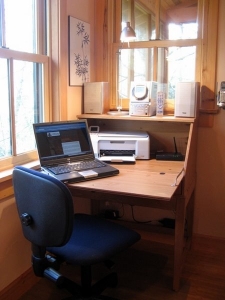Writing and the Splendor of Solitude
At every book reading and presentation, I have been asked questions about how I go about my writing: whether my process is compulsive/disciplined or impulsive/inspired, where I write and how frequently. My answer is that I am impulsively compulsive. I write when I have something to write and am disciplined only about preserving the turning of a good phrase or the building a compelling story.
I do my better work when the surroundings are quiet, and the setting minimizes unnecessary interaction with other living beings. I have had others volunteer to accompany me on research trips and writing jaunts, but I have learned to decline kind offers. It is not that I am a misanthropist or dislike animals. But other spirits intrude with their needs, and I have been told that, with the exception of buzzing insects, I am polite and accommodating to a fault. Thus, almost all of my writing is done in seclusion between the hours of 2 AM and 5 AM when most other beings are sleeping. This is not only because I am free of distraction, but also because I can eschew manners and run wild in the unbecoming “mad man” fugue.

Foxglove Cabin, Whidbey Island Writer’s Refuge
My writing is seldom scheduled. I have an apartment and office separated far enough from the rest of my house in Seattle such that I can spread out, leave books and papers strewn where I need them without embarrassing myself in front of those who do not understand the importance of just enough messiness. I wear noise-canceling earphones and tune into a sound-generating program that simulates the patterns of rain on rooftops. I do know when a chapter is done, and I need to move on to another. But I refuse to place the writing of that next chapter into the confined boxes of a day journal. To hell with calendars. I am no longer dependent on them to make a living, so the time is mine, and outside of that which I cherish for self-expression, is shared almost exclusively with those whom I love.
Another reason I do not carefully tailor writing sessions is that, because for me at least, cooking in the sub-conscious on a problem is part of the solution that will be captured by a set of conscious acts. I expect that is a right-brained thing and just cannot be done on strict timetables. There is no recipe with instructions as to the timing of that. Sometimes it takes years. Sometimes it is never ready. When it is, I try not to spoil the brew before its time or let it molder. And I will get to it. It goes to the “finish-to-finished” stack.
When I sculpt, another calming meditative process, I go to Maury Island to work in a studio I built in the woods, a large protected space filled with wood and clay and stone and weldable metal. And lots of tools. I can make it as messy as I want, and there are no neighbors. I have written words out there as well because it is conducive both to the symmetry of wood-turning and the balance of poetry. And I can read the poetry out loud and imagine that someone I love is listening.
Foxglove Cabin, Whidbey Island Writer’s Refuge
Why offer a writing retreat?
I have decided to offer fellow writers— accomplished or aspiring—the opportunity to lose themselves for a few days in a studio-like environment I am privileged to experience. I believe a writer needs to be free to run in a fugue. It doesn’t matter if the writer finds or accomplishes the final product. What matters is that one has the opportunity to start, and there are no distractions from the obligations of politeness. And when one starts, one is half finished. Perhaps this gift is a test to see if others have a similar experience. If it proves to be helpful, then I plan to take the gift to another level.
Click here for your chance to win the writing retreat: gerardlasalle.com/writers (Contest is closed.)
Thus, if you are the lucky one to win this prize I advise/recommend/give permission/ask you to give yourself permission to you leave behind all bills, phones, schedule books, pets, lovers and mates, the people who irritate you and your past and present bosses. They will be there waiting for you, one way or another, when you get back. If you do bring a laptop, disconnect anything that might tempt you to bring the web and the outside world to you. Place everything you have on your computer’s desktop into a folder and hide it out of sight of your page. Sleep in and stay up way past your bedtime if you like. Get up at 3 am or 10. Bring a bit of ginger tea. Bring a yellow pad, two pencils, and a good gum eraser. If you must use a program other than Word processing app, consider learning Scrivener beforehand to help you keep your writings organized. Save everything.
And get up and exercise. Tom Clancy, who recently passed away, said while he was ill that he regretted that he sat so much.
And finally, do whatever you do to make yourself comfortably selfish. But leave the guilt behind. Because this precious time is yours.
I hope it whets your appetite for more of the splendor of solitude.
Read the first chapters of my award-winning novel, Widow Walk, for free right now. Plus, join the Land Rush to enter a drawing for a chance to win one of these fabulous prizes: a three-day writing retreat at the gorgeous Whidbey Island Writer’s Refuge, a $100 Amazon gift card, a book club party pack with wine and chocolate, and more!

The advice at the end about disconnecting and hiding distractions is very inspiring and profound.
Thank you.
Thank you, Evan. Hope you are doing well.